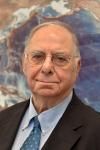Announcement about 2020 Goldschmidt Conference
April 03, 2020
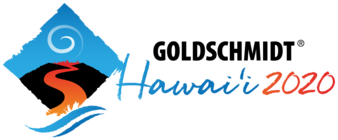
Each year, the Goldschmidt Conference travels to a part of the world to bring together the geochemistry community to share the latest developments in the field as well as supporting, training and encouraging colleagues at the start their careers. Goldschmidt 2020 will be the 30th conference in the series.
The health and safety of our community is our highest priority. In light of the COVID-19 pandemic, the GS and EAG have determined that the conference cannot be held as scheduled in Honolulu. Instead, Goldschmidt 2020 will become the first virtual edition of the conference.
With travel costs and visa requirements removed, we hope that this year's conference will be accessible to more people than ever. The conference will continue to highlight the contributions to the field resulting from scientific observations made in Hawai'i and Oceania.
While a virtual meeting can never entirely replace the networking capacity of a standard meeting, there will be many opportunities to connect with your colleagues virtually, share and discuss new work, and get involved with the programs for early career researchers at the virtual event.
All those who have already registered for the standard meeting will be automatically registered for the virtual experience. You will be contacted directly with regards to reimbursement aligned with the new, reduced pricing structure. Social event, workshop, field trip, childcare and lunch box fees will be refunded automatically.
Details of how events will be presented are still to be confirmed and we will be in touch with colleagues affected when we can provide full instructions for the next steps. We appreciate your patience as we adapt to these very challenging times.
GS Strategic Planning Process
May 29, 2019
In 2018, the GS board identified a need for the society to examine its activities and how well they are serving the international geochemistry community. The organization has a broad mission statement: The Geochemical Society is a nonprofit scientific society founded to encourage the application of geochemistry to improving our understanding of the Earth and solar system. How effective is the society at achieving this mission? To answer that question, the board decided to undertake a strategic planning process this year.
GS Endorses Africa Initiative for Planetary and Space Sciences
June 15, 2017
Research groups in planetary and space sciences are now emerging in Africa, but remain scattered and underfunded. To elevate planetary and space science across the entire African continent, a group of researchers is developing the Africa Initiative for Planetary and Space Sciences. It will involve coordinated actions with international partners for training M.Sc. and Ph.D. students, for developing locally-based scientific facilities, and for the progressive integration of the fascinating discoveries about our solar system into university curricula.
The identified benefits of education and research programs in these fields and the call for endorsement of this initiative are presented in two articles published this week in EOS:
https://eos.org/opinions/africa-initiative-for-planetary-and-space-sciences
https://eos.org/features/the-state-of-planetary-and-space-sciences-in-africa
In May, the GS Board of Directors voted to endorse the initiative along with AGU, EAG, and many other societies. Learn more at https://africapss.org.
John Hayes (1940-2017)
February 10, 2017
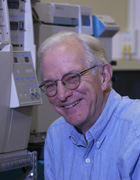 (Image courtesy of Woods Hole Oceanographic Institution)
(Image courtesy of Woods Hole Oceanographic Institution)
John Michael Hayes, born September 6, 1940, passed away at his home in Berkeley, California, on February 3, 2017. John Hayes was a leader in the fields of organic geochemistry and biogeochemistry who opened these fields to stable isotopes with his pioneering work in compound specific isotopes (CSIA). The impact of CSIA in present day chemistry has been wide-reachin; it is used in drug analyses, forensic geochemistry, food processing, blood testing, and environmental geochemistry, and it has entered the popular culture via forensic science focused TV shows. His generosity of spirit and enthusiasm for bringing together the ideas and practitioners of geology, chemistry, and biology to inform each other, was at the core of his impact across disciplines. His ground-breaking work in CSIA and his legacy of an interdisciplinary approach to research was transformative and contributed profoundly to our understanding of the Earth's organic processes.
Ian Hutcheon (1948-2015)
September 21, 2015
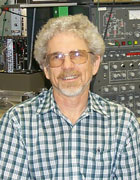
Ian D. Hutcheon, Deputy Director of the Glenn Seaborg Institute and Group Leader of the Chemical and Isotopic Signatures Group in Nuclear and Chemical Sciences Division in the Physical and Life Sciences (PLS) Directorate of Lawrence Livermore National Laboratory, passed away March 26, 2015. He was 67 years old.
Hutcheon earned his PhD in Physics from the University of California, Berkeley in 1974. His expertise with the ion probe began to develop at the University of Chicago when he worked with Joe Smith and then expanded further when he moved to Cal Tech in 1983 to work with Jerry Wasserburg on the applications of secondary ion mass spectrometry to cosmochemistry. He moved to Lawrence Livermore National Laboratory in 1993.
Hutcheon made numerous contributions to the study of the isotopic composition of meteorites and what they reveal about the evolution of the early solar system. He was also a key developer of nuclear forensics as both a field of scientific investigation and a scientific discipline with significant applications to national security. He conducted groundbreaking work in the formation mechanisms of planets and meteorites, diffusion transport processes in terrestrial and planetary melts, glasses and minerals; and conducted the first NanoSIMS-enabled studies of biological materials. He authored over 200 papers and book chapters, and co-wrote the textbook, Nuclear Forensics Analysis with colleagues Pat Grant and Ken Moody.
His awards in recent years included being named, in 2013, a Distinguished Member of Technical Staff at the Laboratory; receiving the Physical and Life Sciences Outstanding Post-doc Mentor award in 2010; and having a newly discovered mineral in the Allende meteorite named in his honor, Hutcheonite. He was named a Fellow of the Meteoritical Society in 1986.
In his 22 years at LLNL, he built the Chemical and Isotopic Signatures Group from himself and 2 others and one secondary ion mass spectrometer to 38 scientists, post-docs, graduate students and technicians. The breadth of study within the members of his group includes time scale and processes of nucleosynthesis; formation and evolution of meteorites and planets; mineralogy and petrology of unequilibrated meteorites; sub-cellular imaging of biological samples and isotope tracing into cells of all types; environmental microbiology; nuclear forensics and attribution.
In recent years Hutcheon and members of his group were involved in establishing collaborations with colleagues at analytical facilities in South Africa, Canada, the UK, and with the IAEA, to help encourage nuclear forensics efforts.
Ian Hutcheon is survived by his wife of 41 years, Nancy Hutcheon, former Education Coordinator for summer internships in PLS, his children, Douglass Hutcheon and Dana Gordon, and hundreds of colleagues in the US and abroad, that he mentored and inspired to scientific excellence.
Nancy Hutcheon
Robert Berner (1935 - 2015)
January 13, 2015
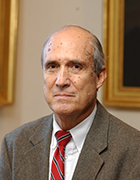
Dear G&G Community:
I write to bring you the sad news that Robert A. Berner, Emeritus Professor of Geology and Geophysics, passed away as a result of pneumonia this weekend. We extend our deepest, heartfelt condolences to his family at this most difficult time.
Bob got his B.S. and M.S. degrees from the University of Michigan, and his Ph.D. from Harvard. He did a postdoc at the Scripps Institution of Oceanography before moving to the University of Chicago as an Assistant Professor in 1963. He came to Yale in 1965, and stayed here for the rest of his career.
Bob was one of the greatest geochemists and, more broadly, geologists who ever lived. It is simply impossible to list all of his accomplishments. Much of his research centered on the quantitative geochemistry of sediments, and it's not an exaggeration to say that he defined the field as we know it. He made seminal contributions to, for example, the geochemistry of sulfides and carbonates in the oceans, diagenesis, weathering, and geochemical cycling. He was a thoughtful teacher and mentor, inspiring a whole generation of geochemists who got their Ph.D.'s or did their postdoctoral research in his lab. Today the students of Bob's students are now making their impact on the field!
Bob's research in any one of the areas he studied would have made a spectacular career. The fact that he made such fundamental contributions to so many areas makes his achievements and legacy all the more remarkable. Arguably his broadest impact has been in the area of carbon cycling. For example, Bob spearheaded the quantitative interpretation of the CO2 content of the atmosphere over the last 600 million years of Earth history. His work provided the basis for virtually all modern carbon cycling research going on today. This understanding of past CO2 levels and paleoclimates has provided an invaluable baseline of comparison for determining the impact of today's anthropogenic CO2 emissions on the atmosphere and the associated climate change.
Bob served the field of geochemistry as the President of the Geochemical Society, and received countless accolades (Guggenheim Fellow; Member, National Academy of Sciences; and many, many others). Bob's long association with the American Journal of Science (Silliman's Journal) as Associate Editor or Editor held special significance for him; indeed, many of his most influential papers were published there.
Bob had a tremendous sense of humor and could talk about almost any topic with enthusiasm and insight. He was an expert on wine (including it's chemistry!) and loved music. Given the importance of what he worked on regarding atmospheric chemistry and carbon cycling, he attracted quite a bit of media attention. I remember one instance where the news media had become very interested in his research on trapped air samples in ancient amber. Part of this translated into print as something along the lines of: Scientists Capture Dinosaur Breath! Bob thought that was hilarious and we all had a great laugh over it too.
I remember a dinner in Bob's honor some years ago. Many of his family members were present. He was holding one of his grandchildren in his arms, pontificating about some great insight he had had about geochemistry. And the little baby just reached up and grabbed his nose. He immediately dissolved into the world of that baby---the science left his mind and you could see how the love that he had for his family was such an integral part of what made him so special.
In accordance with the family's wishes, in lieu of flowers, please consider making a donation in Bob's name to the Geology and Geophysics Graduate Research and Field Studies fund. You can send these by mail to the G&G Chair's office c/o Rebecca Pocock. I highly recommend Bob's fascinating autobiography, which can be found here: http://people.earth.yale.edu/sites/default/files/files/Berner/Robert%20A_%20Berner%20Autobiography.pdf
Sincerely,
Jay
--
Jay J. Ague, Henry Barnard Davis Professor of Geology & Geophysics
Chair, Department of Geology & Geophysics
Yale University, P.O. Box 208109
New Haven CT 06520-8109 USA
Phone: 203-432-3171 FAX: 203-432-3134
jay.ague@yale.edu http://people.earth.yale.edu/profile/jay-ague/about
Curator-in-Charge of Mineralogy & Meteoritics, Yale Peabody Museum of Natural History
Reprinted with permission.
Karl K. Turekian (1927-2013)
March 18, 2013
Karl Turekian, who was the Sterling Professor of Geology and Geophysics at Yale University, passed away March 15. Turekian was a world-renowned geochemist, past President of the Geochemical Society, editor or associate editor for eight geochemistry journals, and author of numerous books and hundreds of papers. He received his A.B. from Wheaton College in 1949 and his Ph.D. from Columbia in 1955 then started what turned out to be a 50 year career as Professor at Yale. Turekian was a larger-than-life personality whose infectious enthusiasm for geochemistry contributed hugely to the development of the field. His personality shines through in his autobiography which chronicles his path through the wide range of geochemical topics to which he contributed over his remarkable career, and well displays his ability to tell a good story.
Devendra Lal (1929-2012)
December 14, 2012
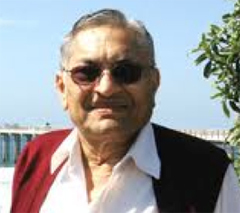
Professor Devendra Lal, an illustrious cosmic ray physicist, Earth and planetary scientist, and distinguished mentor passed away on December 1, 2012 at his residence in San Diego, California. He was 83.
Throughout his long career, Professor Lal was known for the diversity and creativity of his research interests. His early work on the composition and energy spectrum of primary cosmic radiation and in elementary particle physics became the basis for his research on the mechanisms and rates of natural physical and chemical processes on Earth and in the solar system using radionuclides. He published extensively on cosmic ray produced radioisotopes in terrestrial environments, in the atmosphere, in polar ice, in the oceans and oceanic sediments, and in lakes. And he worked on nuclear tracks and radioactivity in lunar samples and meteorites. This work brought him numerous international honors, among them as a Fellow of the Royal Society, Foreign Associate of the US National Academy of Sciences, Fellow of the Indian Academy of Sciences, and recipient of the V. M. Goldschmidt Medal of the Geochemical Society.
To his many friends and colleagues around the world Professor Lal was best known for his insatiable curiosity, his good humor, and as a caring and demanding teacher. He was fond of asking: "What new idea did you have today?" No idea was too big or too outlandish to be considered. He loved to experiment, and if something didn't work he would try it another way. Some of his experiments were gigantic, such as dating ocean waters by submerging meter-sized frames packed with iron-impregnated sponges or fibers into the deep sea for many hours to extract minute quantities of the natural radioisotope silicon32. He often frustrated his colleagues and students with his all-consuming pursuit of science. He was both uncompromising and patient with students, often lamenting their poor preparation, especially in mathematics, but also spending hours with them until they understood the material.
Devendra Lal was born February 14, 1929 to a large family of modest means in Varanasi, India, where he completed his bachelor's and master's education at Banaras Hindu University. His pioneering PhD thesis research on cosmic ray physics at the Tata Institute of Fundamental Research in Bombay (Mumbai) and Bombay University, completed in 1960, had its roots in the origins of modern physics in Germany and the United States through his thesis advisor Professor Bernard Peters, who was a refugee from both Nazism in Germany and McCarthyism in the US.
He first came to the Scripps Institution of Oceanography as a visiting researcher in 1957, and 10 years later as a professor of nuclear geophysics. Over his long career Professor Lal divided his time between Scripps/UC San Diego and appointments in India, first as a professor at the Tata Institute and then as professor and director of the Physical Research Laboratory in Ahmedabad, before making Scripps his full-time academic home in 1989. Professor Lal and his late wife Aruna have been generous supporters of Scripps and PRL, notably through their endowment of the Devendra and Aruna Lal Fellowship in support of creative and exceptional Scripps graduate students and a similar Trust that provides scholarships for selected high school students from Ahmedabad to pursue college educations in science. His wisdom and his good humor will be sorely missed, but his academic legacy and personal impact will remain with us for many years to come.
-Ray Weiss
John J. Mahoney (1952-2012)
November 26, 2012
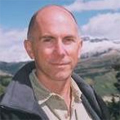
John J. Mahoney had earned a B.A. in biology from the University of Colorado in 1975. He then went back to his native Montana where he worked for a while as a carpenter. During that time John had an 'encounter' with Al Engel working on Al's house. You didn't just meet Al, you definitely had an encounter. Somehow Al had learned about John's interest in deep-sea sediments and encouraged him to apply to Scripps Institution of Oceanography for graduate work. John thought he was interested in sedimentology but once he got to Scripps in 1978 other encounters changed his mind. For his thesis he used high precision isotope data coupled with careful major and trace element analyses to probe the origins of one of the world's major flood basalt provinces, the so-called Deccan Traps of India, as well as a similar but much smaller (although also important) lava outpouring, the Rajmahal Traps (also in India). John earned his Ph.D. in 1984, spent a year at Univ. Minnesota as a postdoc, and shortly thereafter (1985) he moved to the University of Hawaii. John established a radiogenic isotope laboratory at UH and used it to pursue a wide array of research topics, including the causes and consequences of flood basalt volcanism, the formation of oceanic plateaus, linear chain volcanism in the Pacific, and magma formation at mid-ocean-ridges and Hawaiian volcanoes. He pursued related research into topics such as the dynamics of mantle melting and the use of geoneutrinos to understand Earth's internal radioactivity. He was awarded a research excellence medal by UH in 1995, and with Mike Coffin (now at Univ. Tasmania), established the Large Igneous Provinces commission of IAVCEI in 1993, stayed at its helm until 1998. He edited an influential AGU monograph on flood basalt volcanism in the 1990s and was an editor of JGR Solid Earth during the 2000s. John was a dedicated educator and mentor to graduate students and postdocs. He was also an outdoorsman and concerned about the environment. During the 2000 presidential race, he was contacted by Al Gore's team about a possible science advisory position if Gore won the election. John Joseph Mahoney died on Friday 23 November in Honolulu after a brief illness. John was a professor emeritus and research scientist in the department of Geology & Geophysics, and a lover of the natural world. He is survived by his wife Nancy; his siblings Donna Mahoney, Marla Mahoney, and Tom Mahoney, and their families; and by his three WW II jeeps. His wife, Nancy, was with him when he died. As a student and colleague John was thoughtful and polite. One never saw him get really angry - frustrated, maybe (especially with the red tape in India) but not angry. He will certainly be missed.
-Doug Macdougall, Jim Hawkins, Guenter Lugmair, and Ken Rubin (courtesy The Scripps LOG, December 7-14, 2012 vol. 48 no. 49)
Varanasi Rama Murthy (1933-2012)
October 15, 2012
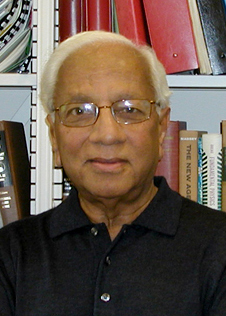
Dr. Varanasi Rama Murthy passed away October 12, 2012. Known simply as Rama to his many friends and colleagues, his career ranged widely with numerous contributions to mantle geochemistry and cosmochemistry as well as to science education. Born July 2, 1933, Rama received his undergraduate training from Andhra University and the Indian School of Mines. He migrated to the United States for his graduate studies resulting in his PhD in Geology from Yale University in 1957. His first postdoctoral studies were on the isotopic composition of meteorites, working with Clair Patterson at Cal Tech to refine the Pb isotope age of the Earth, then with Harold Urey as an Assistant Professor at the newly formed University of California, San Diego on nucleosynthetic anomalies in silver and molybdenum in meteorites and a comparison of samarium, europium and gadolinium isotopic composition between meteorites and Earth rocks to elucidate the role of neutron irradiation in the early solar system.
Moving to his position on the faculty of the University of Minnesota where he stayed from 1965 until his retirement in 2006, Rama's attention turned to chemical and isotopic studies of mantle rocks, a highlight of which is his 1985 Annual Reviews of Earth and Planetary Sciences contribution with Mike Roden on the subject of mantle metasomatism, one of the early expositions on this important process of chemical modification of Earth's interior. On the return of the first Apollo samples, Rama undertook geochronologic and chemical studies of lunar basalts leading to models for the chemical evolution of the Moon (e.g. Rama Murthy et al., Nature 1971).
Following a long term interest in the composition of Earth's core that began with his first paper on the subject in 1970 (Rama Murthy et al., Physics of Earth and Planetary Interiors), Rama is perhaps best known for his suggestion (Science 253, 1991) that the excess siderophile abundances in Earth's mantle might reflect a high-temperature, magma-ocean, formation for the core. In his model, the high-temperature, high-pressure, of this mode of core formation drove metal-silicate partition coefficients of siderophile elements between liquid metal and silicate to lower values than those measured in one atmosphere experiments. This suggestion led to a huge and continuing experimental effort by a number of workers who explored the pressure and temperature dependency of siderophile element partitioning. Rama continued this line of investigations with experimental work of his own withcolleagues at the Geophysical Laboratory to see whether potassium might be soluble in iron metal at high temperature and pressure and thus provide a radioactive heat source inside the core.
While undertaking this active research career, Rama also served a number of administrative roles at the University of Minnesota including the Head of the School of Earth Sciences, Associate Dean and Acting Dean in the Institute of Technology, and Vice Provost and Associate Vice President of Academic Affairs. His generous nature, wide ranging interests, and ability to tell a good story made him a favorite colleague of many and a success in his many academic pursuits. During his career, Rama received numerous awards including election as a Fellow of the AGU, a Life Fellow of the Indian Geophysical Union, and award of the Outstanding Service Award from NASA. Rama retired in 2006 where he continued his scientific pursuits as a Research Professor with the Institute of Meteoritics at the University of New Mexico.
